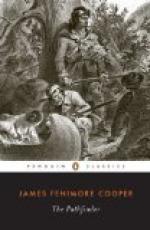“Well, well; I have mistaken your calling, which I had thought as regularly warlike as that of a ship’s gunner. There is my brother-in-law, now; he has been a soldier since he was sixteen, and he looks upon his trade as every way as respectable as that of a seafaring man, a point I hardly think it worth while to dispute with him.”
“My father has been taught to believe that it is honorable to carry arms,” said Mabel, “for his father was a soldier before him.”
“Yes, yes,” resumed the guide; “most of the Sergeant’s gifts are martial, and he looks at most things in this world over the barrel of his musket. One of his notions, now, is to prefer a king’s piece to a regular, double-sighted, long-barrelled rifle. Such conceits will come over men from long habit; and prejudice is, perhaps, the commonest failing of human natur’.”
While the desultory conversation just related had been carried on in subdued voices, the canoes were dropping slowly down with the current within the deep shadows of the western shore, the paddles being used merely to preserve the desired direction and proper positions. The strength of the stream varied materially, the water being seemingly still in places, while in other reaches it flowed at a rate exceeding two or even three miles in the hour. On the rifts it even dashed forward with a velocity that was appalling to the unpractised eye. Jasper was of opinion that they might drift down with the current to the mouth of the river in two hours from the time they left the shore, and he and the Pathfinder had agreed on the expediency of suffering the canoes to float of themselves for a time, or at least until they had passed the first dangers of their new movement. The dialogue had been carried on in voices, too, guardedly low; for though the quiet of deep solitude reigned in that vast and nearly boundless forest, nature was speaking with her thousand tongues in the eloquent language of night in a wilderness. The air sighed through ten thousand trees, the water rippled, and at places even roared along the shores; and now and then was heard the creaking of a branch or a trunk, as it rubbed against some object similar to itself, under the vibrations of a nicely balanced body. All living sounds had ceased. Once, it is true, the Pathfinder fancied he heard the howl of a distant wolf, of which a few prowled through these woods; but it was a transient and doubtful cry, that might possibly have been attributed to the imagination. When he desired his companions, however, to cease talking, his vigilant ear had caught the peculiar sound which is made by the parting of a dried branch of a tree and which, if his senses did not deceive him, came from the western shore. All who are accustomed to that particular sound will understand how readily the ear receives it, and how easy it is to distinguish the tread which breaks the branch from every other noise of the forest.
“There is the footstep of a man on the bank,” said Pathfinder to Jasper, speaking in neither a whisper nor yet in a voice loud enough to be heard at any distance. “Can the accursed Iroquois have crossed the river already, with their arms, and without a boat?”




